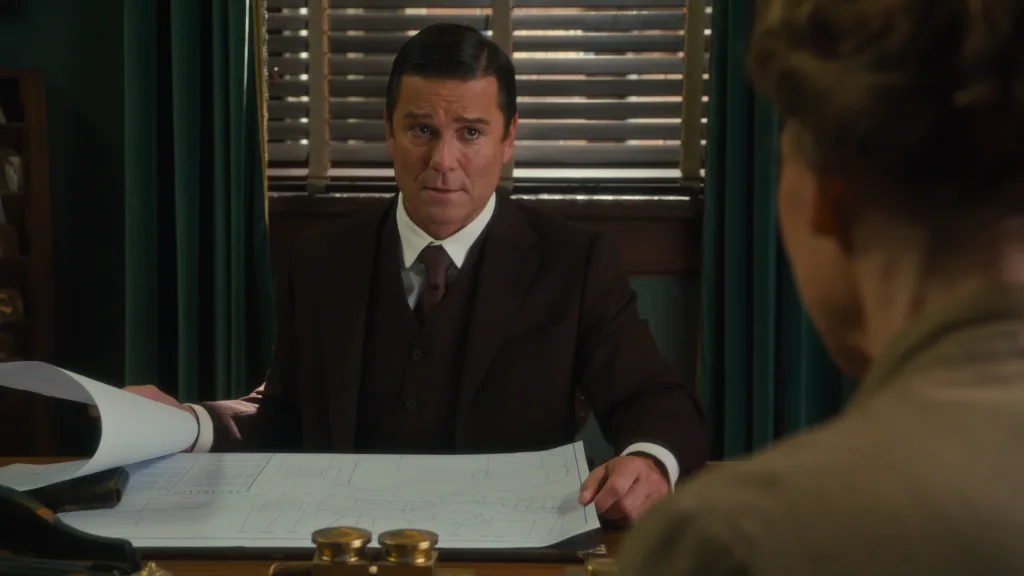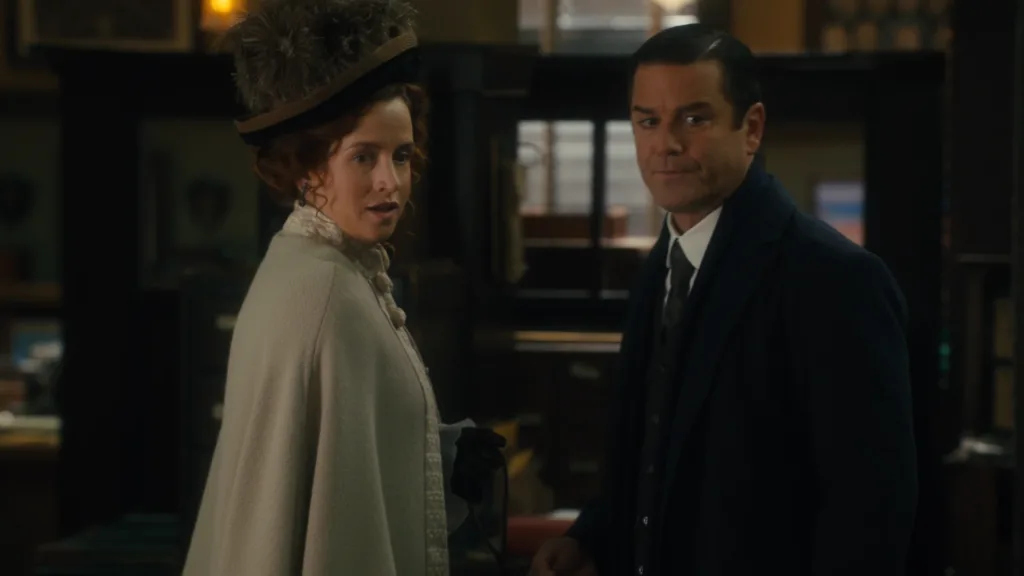S18 E18 – The Incredible Astonishing Adventures of Constable George Crabtree
All the Best Fiction Is Based Somewhat in Reality

Spoiler Warning: Do not read on if you haven't watched this episode!!
Bugalugs is back! Constable George Crabtree (Jonny Harris) returns to Murdoch Mysteries in a deliciously quirky story that blurs the line between fiction and reality, explores what we love about the show’s main characters, and comments on the nature of storytelling. Like Crabtree’s book, this episode is brisk, compelling, and expertly written (I feel like writer Simon McNabb is now writing my reviews for me).
Although Crabtree has once again been absent for the better part of the season, we jump right in with him and Constable Higgins (Lachlan Murdoch) looking at a campy, Batman-style close-up of a front-page headline: “JAILBREAK! CRIMINALS ON THE LOOSE.” This scene is immediately followed by George rescuing a baby falling from a window, accompanied by triumphant music. At this point, you may start to feel that these heroics seem a bit over the top, and Higgins saying things like, George, we’re the Toronto Constabulary. We won’t rest until we’ve caught every last one, feels somewhat out of character. Still, it’s nothing that Murdoch Mysteries hasn’t done before. It doesn’t take long, though, before they start ramping up the clues that this isn’t the usual Murdoch fare.
Bloody hell, Crabtree, he’s straight out of your book
Detective Watts (Daniel Maslany) is even more philosophical and verbose than usual, and his plants seem to have taken over the station house. Then, Murdoch, in his uncharacteristically messy office, uses a swear word—well, it’s Fiddlesticks, but for him, that’s highly profane—and Crabtree casually fixes Murdoch’s latest invention. At this point, even the most casual of viewers will know that this can’t be real, while less irregular viewers will think back to this season’s third episode, What the Dickens?!, where George talked about writing a new book: a fictionalized account of some of the cases the Detective and I have worked on together. But in my telling, the assistant will be the clever one.
It’s obvious now that we are seeing reality through Crabtree’s eyes—or even that we are in his book. This notion is further confirmed by the fact that Brackenreid (Thomas Craig) is the Inspector, not the Chief Constable—and he has a moustache! Instead of a couple of liquor bottles, he now has a cabinet full of them. Still, some things remain the same: it’s still Margaret (Arwen Humphreys) who wears the trousers in the Brackenreid household. The story of the book is compelling, if a tad fantastical. Murdoch and Crabtree investigate the prison break mentioned in the newspaper and a subsequent bank heist. No thanks to Murdoch, who tries to lift fingermarks off a stone wall with a tiny brush (Damn my intransigence!), it’s George who figures out who is responsible for the crime spree: the vengeful Dr. Virgil von Zrill, a DC Comics-type inventor-turned-mechanical man with an origin story to match.
It’s so fantastical as to be absurd. And yet, somehow, it’s true
We are now ten minutes into the episode, and just when you think the entire episode will be from George’s book, we—and Crabtree—are jolted back to reality. Or are we? As it becomes clear that Murdoch’s latest case has some striking similarities to George’s manuscript—including a mechanical man with a cannon for an arm—the narrative structure takes us from reality to inside George’s head and back again. By playing with the concept of fiction itself, writer Simon McNabb and director Jayson Clute explore the nature of storytelling, narrative structures, and the role of the reader/viewer. Some of Crabtree’s remarks about the villain’s backstory and motivation, about keeping it just real enough, and about people not liking the ending of his manuscript, seem to be lifted straight from the writer’s room. Not to mention the fact that the readers love the racy bits. It’s a feat of meta storytelling, with the line between fiction and reality blurring.
It’s these alternating perspectives that demonstrate exactly how well Simon McNabb knows and understands these characters. Flipping (Murdoch and Crabtree) or exaggerating (Brackenreid and Watts) their traits, as well as their reactions, is done to great comedic effect. Murdoch, portrayed by Crabtree as a ninny (dixit Brackenreid), is sarcastic: I, too, often find I strain against the bounds of my intellect. It’s quite frustrating. Luckily, I have a constable on hand whose genius, insight and physical prowess know no bounds. In addition, he has some mathematical and scientific corrections to help make the book more… realistic. Brackenreid objects to being written as a henpecked drunk, while Watts becomes sore and taciturn; he just can’t get over being seen as a blathering philosopher. George’s repeatedly interrupted well, when one creates a work of fiction only makes it funnier. Fortunately for George, Effie thinks the racy bits are the most believable.
Constable George Crabtree. Let’s do this
It is also worth pointing out what a wonderful cast of secondary characters this episode has and how talented the actors portraying them are. Publisher Charles Chalk (Brandon McGibbon) is wonderfully over the top, not just when laughing maniacally in George’s imaginings, but even in the scenes set in reality. His exchange with Crabtree about his name is well-written and delivered with great comedic timing by both actors. The cellmate, played by Paul Thomas, is profoundly weaselly and exudes “small-time crook”; the drunk witness (Bryan Hatt) is inebriated and eloquent at the same time; and the actors playing Philip Armstrong and Vernon Lloyd (Evan Stern and Laurent Pitre) make their fantastical and absurd story almost believable.
But it’s George himself who is portrayed most lovingly here. As we look through his eyes, we see, of course, how imaginative he is, and what a lovable goofball he can be. Most of all, we see that he thinks of himself as happy and lucky that the world has given so much to him. He is humble enough not to realise that he’s a good man, and Effie needs to point out to him that every privilege that’s been afforded to you has come because you meet the world with kindness and love.
A Smash Hit
It makes total sense that George should be the one to wear the bulletproof suit in the final showdown. After all, if it wasn’t for his awe-inspiring, otherworldly imagination, none of this would be happening. Still, it’s Murdoch who comes up with the fantastical idea to fight fire with fire and build their own mechanical man. He also constructs a coil around the statue of Queen Victoria to create an electromagnetic field that ultimately defeats the villain. And it’s Watts who knows where to look for the mechanical man. Like the readers of George’s new book, The Incredible Astonishing Adventures of Constable George Crabtree, I love that ending. Instead of the hero doing it all himself, all the characters had to come together to defeat the villain.




Great review and terrific episode. It’s one of my top ten!